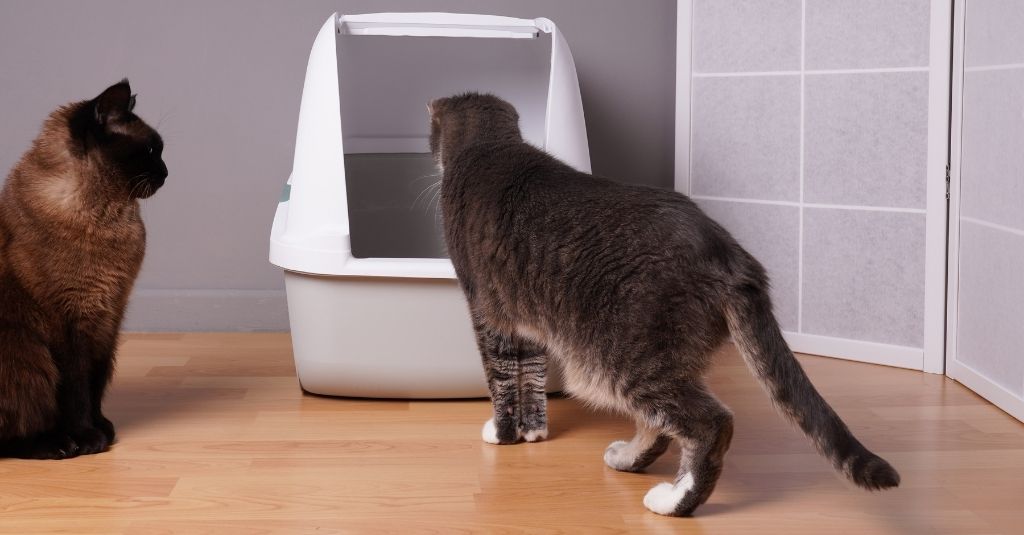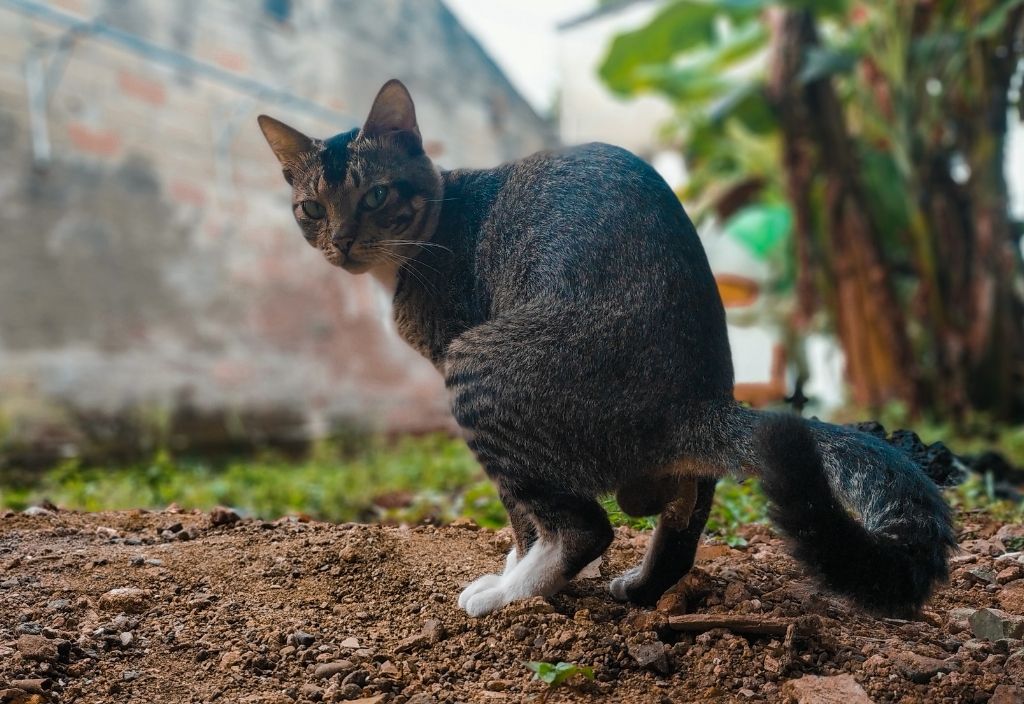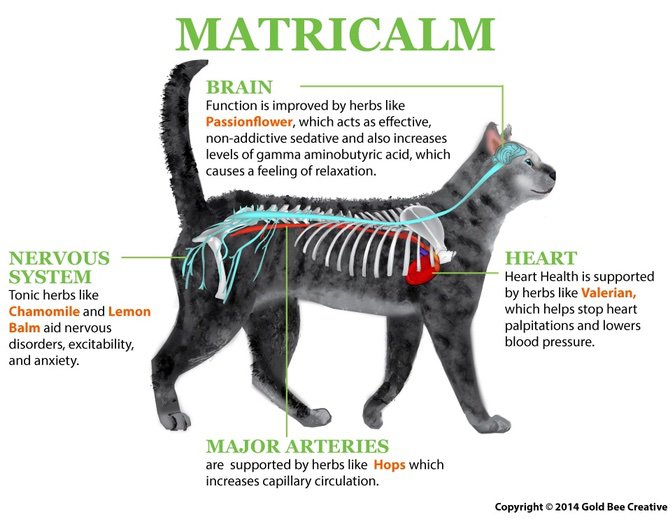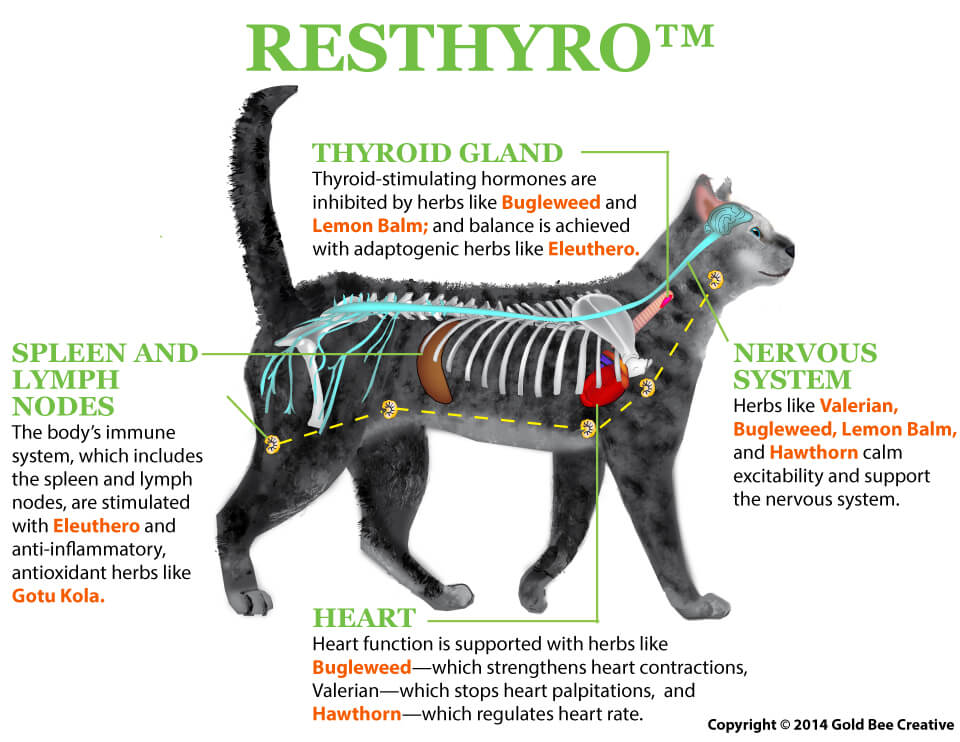anxiety & aggression support

free shipping over $100 (USA & Canada)
1-877-937-4372 the pet expert hotline

Herbal Digestive Aid, Energy Booster, and Multivitamin for Cats


You may be asking yourself ‘why is my cat eating poop?’ Whether it’s their own or someone else’s, this behavior is totally gross! As a pet parent, you may be wondering what you can do to curb this behavior or if there are ways to prevent this habit. So, let’s get into the nitty-gritty.
There are definitely instances of both kittens and adult cats snacking on poop. The behavior of eating poop is known as coprophagia. Coprophagia can also happen in dogs and other species of pets.
Some scientists theorize that young cats eat their poop to encourage normal intestinal flora to take root.
At certain life stages, eating feces may be pretty normal and even helpful behavior. Nursing mama cats frequently give their kittens tongue baths. This helps to keep them clean and encourages them to go to the bathroom on their own. Coprophagia can be normal behavior for young cats as well as dogs. Kittens are not born with gut bacteria. Some scientists theorize that young cats eat their poop to encourage normal intestinal flora to take root. Unfortunately, even if this habit started naturally, it can be tough to break. Young cats may grow out of it, but some don’t!
For some kitties, an unbalanced diet, malnutrition, or not eating enough calories may lead to them eating poop. Other causes can include intestinal parasites, poor nutrient absorption, and issues along the digestive tract. Less common reasons cats eat poop may be because their body thinks they are hungry when they are not; this is known as polyphagia. Certain diseases like thyroid disease, Cushing’s disease, and diabetes mellitus may cause polyphagia. Occasionally, eating feces may be lumped into a larger category of eating inappropriate things, called pica. Illnesses such as liver disease or anemia may trigger this behavior. Cognitive dysfunction may also lead to cats eating poop. The good news is that a trip to the vet, combined with lab work and fecal exams, can help pinpoint the problem. It can also help you work towards an appropriate care plan.

An underlying behavioral issue is more likely to cause a cat to eat poop than a medical issue. Even if the problem started out as a normal part of their development, it can become a compulsive habit that is hard to break. Some pets actually develop a liking for the taste of poop, which makes it even harder.
Some common behavioral causes include stress and anxiety. Separation anxiety or changes to their daily routine are common underlying causes. Boredom or a lack of playtime may also lead to coprophagia, especially if they are confined to a small space for the first few months of their life. Another unexpected cause of cats eating poop stems from a pet wanting to avoid getting in trouble. It may be that they have an accident outside of the litter box and want to avoid upsetting their pawrent. So, they start to eat the evidence. This habit may also develop in pets with arthritis or cognitive dysfunction who have difficulty making it to the bathroom in time.
There are certain health risks if your cat eats poop. For example, if they eat the poop of a pet on thyroid medication, they may get sick from absorbing some of the medication. It also increases the risk of infection from Salmonella, E.Coli or internal parasites.
To help deter your kitty from this habit, here are a few things you can try:
Depending on what the cause of the coprophagia is, we have different supplements that could help.
For cats suffering from stress and anxiety-induced coprophagia, we recommend Matricalm. This all-natural blend of calming herbs helps to relax your kitty and helps to discourage restless behavior.
For cats with a parasitic infection, we recommend ourNatural Deworming Gold Kit. It contains two of our supplements, Inulin-PK and Milk Thistle, to encourage the elimination of parasites and to help encourage gut healing.
For cats suffering from an endocrine disorder like hyperthyroidism or Cushing’s, we have supplements that are ailment-specific. Resthyro is our supplement formulated specifically for hyperthyroidism. It promotes balanced thyroid function and can help with symptoms like increased appetite. Supraglan is helpful for pets with adrenal disorders like Cushing’s disease. It supports healthy adrenal function and can also help manage symptoms.
If your pet needs support with their diet, we recommend Multi Essentials and Yucca. Together, these two supplements help deliver vital nutrients to the body and encourage better digestion and absorption. For pet parents looking for a well-balanced home-cooked diet, our in-house vet Dr. Amanda offers personalized nutrition plans that consider your pet’s unique needs.
You can always count on us if you ever need us. We are just a message away, so tap on the button below to start chatting with us!
anxiety & aggression support

Natural Help for Stress Reduction, Anxiety Relief, Behavioral Problems, and Aggression in Cats
buy 2 and save $3
3 month supply for a small to medium size pet
Matricalm is an all-natural supplement that provides anxiety and stress relief in cats and promotes calm behavior.

Matricalm is an all-natural supplement that provides anxiety and stress relief in cats and promotes calm behavior.
Help reduce aggressive behavior and provide anxiety and stress relief for your cat with Matricalm, a natural herbal product designed to help reduce excitability in your pet. Cats can become anxious or aggressive when exposed to other animals or to people they are unfamiliar with. When this occurs they may hiss, scratch, howl, or urinate inappropriately.
It’s important to remember that a significant cause of illness in pets results from stress. Helping to keep your cat stress free can help keep them healthier for longer. NHV Pet Experts also often recommend Matricalm for cats dealing with FIV, cancer, kidney issues, hyperthyroidism, and more.
See how NHV Matricalm helped kitty Kimba with yowling and stress.

Chamomile – Contains sedative properties. Chamomile also helps the immune system and has a strong affinity for the nervous system.
Passion Flower – An effective, non-addictive sedative. It helps increase gamma-aminobutyric acid (GABA) in the brain, which helps cause a feeling of relaxation. Passion Flower also has strong anti-inflammatory and pain-relieving properties.
Lemon Balm – An aromatic herb used for nervous disorders, excitability, and anxiety. In addition, lemon balm helps lower blood pressure.
Valerian – Helps stop heart palpitations, relaxes spasms, relieves pain, and regulates the nervous system. Valerian also helps improve sleep latency and sleep quality.
Hops – Tension, anxiety, and stress relief in cats. Hops have traditionally been used to help with mood disturbances, such as restlessness and anxiety.
Select your pet's weight to determine the correct dose.
To be taken twice daily. Determine your pet’s weight and then use the easy chart below to determine the correct dose. This is the minimum dosage.
Pet's Weight Dosage
0 - 15 lb = 0.5 ml
16 - 30 lb = 1.0 ml
31 - 45 lb = 1.5 ml
46 - 60 lb = 2.0 ml
61 - 75 lb = 2.5 ml
Over 75 lb = 3.0 ml
How to Administer
Shake well before use. The easiest method is to use the dropper provided and place the drops into your pet’s food or favorite treat. You can also use the dropper and squirt directly into the pet’s mouth.
Some pets can be finicky. If this occurs, consider hiding the drops in foods most pets love, such as fish, chicken, yogurt or a favorite treat. If your pet only eats dry food, then soak a few kibbles at feeding time.
For Best Results
Herbal dietary supplements are beneficial to the health and well-being of your pet and are safe for long-term use. Every pet responds to natural herbal supplements differently. Therefore, it is important to be consistent and administer the product daily. Supplements generally take two to four weeks to take effect; however, this interval will vary from one animal to the next.
Product Storage
All NHV Natural Pet Products are pure herbal extracts and contain no artificial additives, preservatives, or coloring. Shelf life after opening is six months, and it must be refrigerated after opening.
Cautions and Contraindications
Do not use Matricalm for cats as stress relief in pregnant or nursing animals. Speak to your vet before using our products. A second visit is recommended if your pet’s condition does not improve or deteriorates after the continued use of the supplements.
All information provided by NHV Natural Pet Products is for educational purposes only.
Help reduce aggressive behavior and provide anxiety and stress relief for your cat with Matricalm, a natural herbal product designed to help reduce excitability in your pet. Cats can become anxious or aggressive when exposed to other animals or to people they are unfamiliar with. When this occurs they may hiss, scratch, howl, or urinate inappropriately.
It’s important to remember that a significant cause of illness in pets results from stress. Helping to keep your cat stress free can help keep them healthier for longer. NHV Pet Experts also often recommend Matricalm for cats dealing with FIV, cancer, kidney issues, hyperthyroidism, and more.
See how NHV Matricalm helped kitty Kimba with yowling and stress.

Chamomile – Contains sedative properties. Chamomile also helps the immune system and has a strong affinity for the nervous system.
Passion Flower – An effective, non-addictive sedative. It helps increase gamma-aminobutyric acid (GABA) in the brain, which helps cause a feeling of relaxation. Passion Flower also has strong anti-inflammatory and pain-relieving properties.
Lemon Balm – An aromatic herb used for nervous disorders, excitability, and anxiety. In addition, lemon balm helps lower blood pressure.
Valerian – Helps stop heart palpitations, relaxes spasms, relieves pain, and regulates the nervous system. Valerian also helps improve sleep latency and sleep quality.
Hops – Tension, anxiety, and stress relief in cats. Hops have traditionally been used to help with mood disturbances, such as restlessness and anxiety.
Select your pet's weight to determine the correct dose.
To be taken twice daily. Determine your pet’s weight and then use the easy chart below to determine the correct dose. This is the minimum dosage.
Pet's Weight Dosage
0 - 15 lb = 0.5 ml
16 - 30 lb = 1.0 ml
31 - 45 lb = 1.5 ml
46 - 60 lb = 2.0 ml
61 - 75 lb = 2.5 ml
Over 75 lb = 3.0 ml
How to Administer
Shake well before use. The easiest method is to use the dropper provided and place the drops into your pet’s food or favorite treat. You can also use the dropper and squirt directly into the pet’s mouth.
Some pets can be finicky. If this occurs, consider hiding the drops in foods most pets love, such as fish, chicken, yogurt or a favorite treat. If your pet only eats dry food, then soak a few kibbles at feeding time.
For Best Results
Herbal dietary supplements are beneficial to the health and well-being of your pet and are safe for long-term use. Every pet responds to natural herbal supplements differently. Therefore, it is important to be consistent and administer the product daily. Supplements generally take two to four weeks to take effect; however, this interval will vary from one animal to the next.
Product Storage
All NHV Natural Pet Products are pure herbal extracts and contain no artificial additives, preservatives, or coloring. Shelf life after opening is six months, and it must be refrigerated after opening.
Cautions and Contraindications
Do not use Matricalm for cats as stress relief in pregnant or nursing animals. Speak to your vet before using our products. A second visit is recommended if your pet’s condition does not improve or deteriorates after the continued use of the supplements.
All information provided by NHV Natural Pet Products is for educational purposes only.
adrenal support

Support for adrenal dysfunction, Cushing’s and Addison’s disorders for cats
buy 2 and save $3
3 month supply for a small to medium size

Order Supraglan today and help your cat enjoy a healthier life. Supraglan is an all-natural vet-formulated supplement designed to help your pet cope with symptoms of Adrenal Gland Dysfunction including increased thirst, frequent urination, hair loss, and skin problems. Adrenal Gland Dysfunction occurs when the adrenal glands produce too many or too few hormones, affecting many basic body functions including blood pressure, heart rate, and glucose levels.
Borage – balance endocrine system functions, restores the adrenal cortex, and helps eliminate toxins.
Astragalus – Strengthens the immune system and acts as an anti-inflammatory.
Bistort – A soothing anti-inflammatory that has a tonic effect on the liver and kidneys.
Eleuthero – A root that supports the adrenal gland function and helps balance a sluggish metabolism.
Wild Yam – A herb that acts as a liver tonic and helps normalize hormone production.
Licorice – An adrenal support and anti-inflammatory.
Dandelion – A highly nutritious food that helps balance liver secretions and improves digestion.
Select your pet's weight to determine the correct dose.
To be taken twice daily. Determine your pet’s weight and then use the easy chart below to determine the correct dose. This is the minimum dosage.
Pet's Weight Dosage
0 - 15 lb = 0.5 ml
16 - 30 lb = 1.0 ml
31 - 45 lb = 1.5 ml
46 - 60 lb = 2.0 ml
61 - 75 lb = 2.5 ml
Over 75 lb = 3.0 ml
How to Administer
Shake well before use. The easiest method is to use the dropper provided and place the drops into your pet’s food or favorite treat. You can also use the dropper and squirt directly into the pet’s mouth. Some pets can be finicky, if this occurs consider hiding the drops in foods most pet’s love such as fish, chicken or yogurt or a favorite treat. If your pet only eats dry food then soak a few kibbles at feeding time.
For Best Results
Herbal dietary supplements are beneficial to the health and well-being of your pet and are safe for long-term use. Every pet responds to natural herbal supplements differently, therefore it is important to be consistent and administer the product daily. Supplements generally take two to four weeks to take effect, however this will vary from one animal to the next.
Product Storage
All NHV Natural Pet Products are pure herbal extracts and contain no artificial additives, preservatives or coloring. Shelf life after opening is 6 months and must be refrigerated after opening.
Cautions and Contraindications
Do not use Supraglan in pregnant or nursing animals. Speak to your vet before using our products. A second visit is recommended if your pet’s condition does not improve, or deteriorates after continued use of the supplements.
All information provided by NHV Natural Pet Products is for educational purposes only.
Order Supraglan today and help your cat enjoy a healthier life. Supraglan is an all-natural vet-formulated supplement designed to help your pet cope with symptoms of Adrenal Gland Dysfunction including increased thirst, frequent urination, hair loss, and skin problems. Adrenal Gland Dysfunction occurs when the adrenal glands produce too many or too few hormones, affecting many basic body functions including blood pressure, heart rate, and glucose levels.
Borage – balance endocrine system functions, restores the adrenal cortex, and helps eliminate toxins.
Astragalus – Strengthens the immune system and acts as an anti-inflammatory.
Bistort – A soothing anti-inflammatory that has a tonic effect on the liver and kidneys.
Eleuthero – A root that supports the adrenal gland function and helps balance a sluggish metabolism.
Wild Yam – A herb that acts as a liver tonic and helps normalize hormone production.
Licorice – An adrenal support and anti-inflammatory.
Dandelion – A highly nutritious food that helps balance liver secretions and improves digestion.
Select your pet's weight to determine the correct dose.
To be taken twice daily. Determine your pet’s weight and then use the easy chart below to determine the correct dose. This is the minimum dosage.
Pet's Weight Dosage
0 - 15 lb = 0.5 ml
16 - 30 lb = 1.0 ml
31 - 45 lb = 1.5 ml
46 - 60 lb = 2.0 ml
61 - 75 lb = 2.5 ml
Over 75 lb = 3.0 ml
How to Administer
Shake well before use. The easiest method is to use the dropper provided and place the drops into your pet’s food or favorite treat. You can also use the dropper and squirt directly into the pet’s mouth. Some pets can be finicky, if this occurs consider hiding the drops in foods most pet’s love such as fish, chicken or yogurt or a favorite treat. If your pet only eats dry food then soak a few kibbles at feeding time.
For Best Results
Herbal dietary supplements are beneficial to the health and well-being of your pet and are safe for long-term use. Every pet responds to natural herbal supplements differently, therefore it is important to be consistent and administer the product daily. Supplements generally take two to four weeks to take effect, however this will vary from one animal to the next.
Product Storage
All NHV Natural Pet Products are pure herbal extracts and contain no artificial additives, preservatives or coloring. Shelf life after opening is 6 months and must be refrigerated after opening.
Cautions and Contraindications
Do not use Supraglan in pregnant or nursing animals. Speak to your vet before using our products. A second visit is recommended if your pet’s condition does not improve, or deteriorates after continued use of the supplements.
All information provided by NHV Natural Pet Products is for educational purposes only.
hyperthyroidism support

Support for Hyperthyroidism in Cats
buy 2 and save $3
3 month supply for a small to medium size
A vet-formulated feline hyperthyroidism remedy designed to help balance thyroid function, as well as manage secondary feline hyperthyroidism symptoms.

A vet-formulated feline hyperthyroidism remedy designed to help balance thyroid function, as well as manage secondary feline hyperthyroidism symptoms.
NHV Resthyro™ feline hyperthyroidism remedy is made with quality herbs that are formulated to work together to support the balance of your cat’s thyroid function, support the organs affected by hyperthyroidism, and support feline hyperthyroidism symptoms. This formula has helped to support feline hyperthyroidism, for thousands of pets across the world!
Resthyro™ was formulated by a holistic veterinarian and a master herbalist with a combined 50 years of experience treating pets. It’s made using powerful herbs such as eleuthero, bugleweed, lemon balm, and gotu kola. Together, these and other ingredients help to balance thyroid hormones in your pet’s body. They help your pet’s blood pressure healthier and promote better management of stress. As a feline hyperthyroidism remedy, this supplement can be taken alongside your vet’s prescribed medication to provide comprehensive support.
Hyperthyroidism in cats is caused by excess production of thyroid hormones (T3 and T4). One of the most common causes of feline hyperthyroidism is a hormone-producing benign tumor. Most cases of cats with hyperthyroidism are older pets (generally over 10 years of age).
Cats with symptoms of feline hyperthyroidism may also experience secondary problems such as mild liver, kidney, or heart disease.
NHV supplements include multiple all-natural remedies for feline hyperthyroidism. If your cat is experiencing liver problems, we suggest NHV Milk Thistle; for kidney issues, we suggest NHV Tripsy; and for heart conditions, we suggest combining NHV Hearty Heart with Resthyro™.

Eleuthero – Helps to balance the thyroid, stimulates the immune system, and helps to improve resistance to stress.
Bugleweed – Helps to reduce thyroid hormones in the body. It also slows and strengthens heart contractions. Relieves tension and irritability, and acts as a cough suppressant.
Lemon Balm – Inhibits thyroid activity by blocking thyroid-stimulating hormones. Also found to reduce stress, decrease blood pressure, and improve gastrointestinal activity.
Gotu Kola – A small green herb known for its cleansing abilities and used to treat skin problems. It also has strong antioxidant, antibacterial, and anti-inflammatory properties.
Hawthorn – Helps strengthen and improve heart function.
Skullcap – Known for its relaxing and detoxifying qualities, as well as its ability to stimulate kidney function.
Valerian – Well known for its use in the treatment of anxiety, and has been used extensively as a mild sedative and pain reliever.
Select your pet's weight to determine the correct dose.
To be taken twice daily. Determine your pet’s weight and then use the easy chart below to determine the correct dose. This is the minimum dosage.
Pet's Weight Dosage
0 - 15 lb = 0.5 ml
16 - 30 lb = 1.0 ml
31 - 45 lb = 1.5 ml
46 - 60 lb = 2.0 ml
61 - 75 lb = 2.5 ml
Over 75 lb = 3.0 ml
How to Administer
Shake well before use. The easiest method is to use the dropper provided and place the drops into your pet’s food or favorite treat. You can also use the dropper and squirt directly into the pet’s mouth.
Some pets can be finicky, if this occurs consider hiding the drops in foods most pet’s love such as fish, chicken or yogurt or a favourite treat. If your pet only eats dry food then soak a few kibbles at feeding time.
For Best Results
Herbal dietary supplements are beneficial to the health and well-being of your pet and are safe for long-term use. Every pet responds to natural herbal supplements differently, therefore it is important to be consistent and administer the product daily. Supplements generally take two to four weeks to take effect, however this will vary from one animal to the next.
Product Storage
All NHV Natural Pet Products are pure herbal extracts and contain no artificial additives, preservatives or coloring. Shelf life after opening is 6 months and must be refrigerated after opening.
Cautions and Contraindications
Do not use Resthyro™ in pregnant or nursing animals. Should not be used in animals with hypothyroidism (under active thyroid gland). Speak to your vet before using our products. A second visit is recommended if your pet’s condition does not improve, or deteriorates after continued use of the supplements.
All information provided by NHV Natural Pet Products is for educational purposes only.
NHV Resthyro™ feline hyperthyroidism remedy is made with quality herbs that are formulated to work together to support the balance of your cat’s thyroid function, support the organs affected by hyperthyroidism, and support feline hyperthyroidism symptoms. This formula has helped to support feline hyperthyroidism, for thousands of pets across the world!
Resthyro™ was formulated by a holistic veterinarian and a master herbalist with a combined 50 years of experience treating pets. It’s made using powerful herbs such as eleuthero, bugleweed, lemon balm, and gotu kola. Together, these and other ingredients help to balance thyroid hormones in your pet’s body. They help your pet’s blood pressure healthier and promote better management of stress. As a feline hyperthyroidism remedy, this supplement can be taken alongside your vet’s prescribed medication to provide comprehensive support.
Hyperthyroidism in cats is caused by excess production of thyroid hormones (T3 and T4). One of the most common causes of feline hyperthyroidism is a hormone-producing benign tumor. Most cases of cats with hyperthyroidism are older pets (generally over 10 years of age).
Cats with symptoms of feline hyperthyroidism may also experience secondary problems such as mild liver, kidney, or heart disease.
NHV supplements include multiple all-natural remedies for feline hyperthyroidism. If your cat is experiencing liver problems, we suggest NHV Milk Thistle; for kidney issues, we suggest NHV Tripsy; and for heart conditions, we suggest combining NHV Hearty Heart with Resthyro™.

Eleuthero – Helps to balance the thyroid, stimulates the immune system, and helps to improve resistance to stress.
Bugleweed – Helps to reduce thyroid hormones in the body. It also slows and strengthens heart contractions. Relieves tension and irritability, and acts as a cough suppressant.
Lemon Balm – Inhibits thyroid activity by blocking thyroid-stimulating hormones. Also found to reduce stress, decrease blood pressure, and improve gastrointestinal activity.
Gotu Kola – A small green herb known for its cleansing abilities and used to treat skin problems. It also has strong antioxidant, antibacterial, and anti-inflammatory properties.
Hawthorn – Helps strengthen and improve heart function.
Skullcap – Known for its relaxing and detoxifying qualities, as well as its ability to stimulate kidney function.
Valerian – Well known for its use in the treatment of anxiety, and has been used extensively as a mild sedative and pain reliever.
Select your pet's weight to determine the correct dose.
To be taken twice daily. Determine your pet’s weight and then use the easy chart below to determine the correct dose. This is the minimum dosage.
Pet's Weight Dosage
0 - 15 lb = 0.5 ml
16 - 30 lb = 1.0 ml
31 - 45 lb = 1.5 ml
46 - 60 lb = 2.0 ml
61 - 75 lb = 2.5 ml
Over 75 lb = 3.0 ml
How to Administer
Shake well before use. The easiest method is to use the dropper provided and place the drops into your pet’s food or favorite treat. You can also use the dropper and squirt directly into the pet’s mouth.
Some pets can be finicky, if this occurs consider hiding the drops in foods most pet’s love such as fish, chicken or yogurt or a favourite treat. If your pet only eats dry food then soak a few kibbles at feeding time.
For Best Results
Herbal dietary supplements are beneficial to the health and well-being of your pet and are safe for long-term use. Every pet responds to natural herbal supplements differently, therefore it is important to be consistent and administer the product daily. Supplements generally take two to four weeks to take effect, however this will vary from one animal to the next.
Product Storage
All NHV Natural Pet Products are pure herbal extracts and contain no artificial additives, preservatives or coloring. Shelf life after opening is 6 months and must be refrigerated after opening.
Cautions and Contraindications
Do not use Resthyro™ in pregnant or nursing animals. Should not be used in animals with hypothyroidism (under active thyroid gland). Speak to your vet before using our products. A second visit is recommended if your pet’s condition does not improve, or deteriorates after continued use of the supplements.
All information provided by NHV Natural Pet Products is for educational purposes only.
Published: June 7, 2022